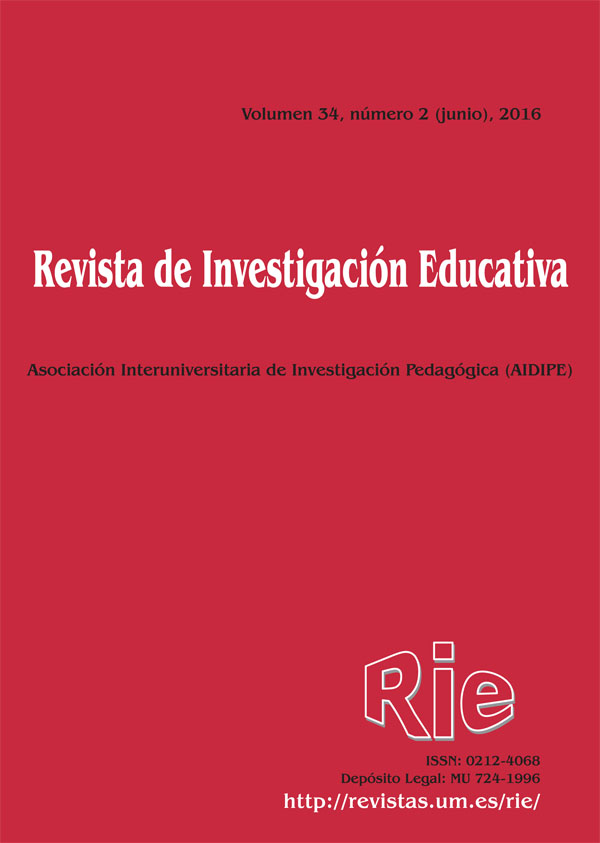Transforming knowledge in university education. A PCK studies approach
Supporting Agencies
- Proyecto de investigación “El conocimiento profesional del profesorado universitario
- procesos de construcción y transferencia a la práctica docente” (EDU-2008-05964-C03-01/EDUC) Ministerio de Ciencia e Innovación. Dirección General de Programas y Transfe
Abstract
The objective of this paper is to present the process followed and the results obtained in a research project whose aim was to determine how Pedagogical Content Knowledge (PCK) reveals itself in university education, and specifically in the modifications that teaching staff make in their materials so that students may understand them more easily. The research, carried out through case studies, makes uses of various information gathering strategies, such as classroom observations, in-depth interviews with teaching staff, and group interviews with students. The results obtained offer information about some of the specific adaptations carried out by teachers in order to simplify their teaching materials using forms and resources accessible to students’ structures of knowledge. Finally, our results also offer significant information about the characteristics and mode of acquisition of PCK in the university context.Downloads
-
Abstract870
-
PDF (Español (España))735
References
Abell, S.K. (2008). Twenty years later: Does pedagogical content knowledge remain a useful idea? International Journal of Science Education, 30(10), 1405-1416.
Barkley, E., Cross, P. & Howell, C. (2007). Técnicas de aprendizaje colaborativo. Madrid: Morata.
Berry, A., Loughran, J., Smith, K. & Lindsay, S. (2009). Capturing and enhancing Science Teachers ‘Professional Knowledge. Res Sci Educ, 39, 575-594.
Berry, A.; Lougrhan, J. y Van Driel, J.H. (2008). Revisiting the roots of pedagogical content knowledge. International Journal of Science Education, 30(10), 1271-1279.
Black, J.W. (2008). Content Knowledge and Pedagogical Content Knowledge of Alge- bra Teachers and Changes in Both Types of Knowledge as a Result of Professional Development. En M. Quazi (Ed.), Proceedings of the 5th Annual TEAM-Math Partners hip Conference Pre-Session (pp. 30-40). Tuskegee, AL: Tuskegee University.
Eraut, M. (2004). Informal learning in the workplace. Studies in Continuing Education, 26(2), 247-273.
Geertz, C. (1987). La interpretación de las culturas. Barcelona: Gedisa.
Glaser, B. & Strauss, A. (1967). The discovery of Grounded Theory. Chicago: Aldine. Hashweh, M.Z. (2005). Teacher pedagogical constructions: A reconfiguration of pedago- gical content knowledge. Teachers and Teaching: Theory and Practice, 11(3), 273-292.
Huertas, J.A. (2009). Aprender a fijarse metas: Nuevos estilos motivacionales, En Pozo, J.I. & Pérez Echeverría, M.P. (coord.) Psicología del aprendizaje universitario: la formación en competencias, (pp.164-181). Madrid: Narcea.
Jarauta, B. & Medina Moya, J.L. (2012). Fuentes y procesos de aprendizaje docente en el contexto universitario. Revista Española de Pedagogía, 252, 337-353.
Kind, V. (2009). Pedagogical content knowledge in science education: Potential and perspectives for progress. Studies in Science Education, 45(2), 169-204.
Loewenberg, D., Hoover, M. & Phelps, G. (2008). Content Knowledge for Teaching. What Makes it Special? Journal of Teacher Education, 59(5), 398-407.
Medina, J.L. & Jarauta, B. (2013). Análisis del Conocimiento Didáctico del Contenido de tres profesores universitarios. Revista de Educación, 360, 600-623 http://doi:10.4438/1988-592X-RE-2011-360-131
Rohaan, E., Taconis, R. & Jochems, W. (2010). Analysing teacher knowledge for techno- logy education in primary schools. International Journal of Technology and Design Education, 22(3), 271-280.
Ruberto, L.A.M.; Mac, W.P., Calabró, A. & Rodríguez, J. (2012). Conocimiento Didáctico del Contenido (CDC) en la enseñanza universitaria de Biotecnología. El caso de la velocidad específica de crecimiento microbiano (μ). Revista Eureka sobre Enseñanza y Divulgación de las Ciencias, 9 (3), 353-360.
Rué, J. (2007). Enseñar en la universidad. El EEES como reto para la Educación Superior. Madrid: Narcea.
Sandin, M. P. (2000). Criterios de validez en la investigación cualitativa: de la objetividad a la solidaridad. Revista de Investigación Educativa, 18(1), 223-242.
Serrano, J.M. y Pons, R. (2011). El constructivismo hoy: enfoques constructivistas en educación. Revista Electrónica de Investigación Educativa, 13(1), 1-27.
Shulman, L.S. (1986). Those who understand: knowledge growth in teaching. Educa- tional Researcher, 15(2), 4-14.
Tang, S.Y.F. (2010). Teachers ‘professional knowledge construction in Assessment for Learning. Teachers and Teaching: theory and practice, 16(6), 665-678.
Tardif, M. (2004). Los saberes del docente y su desarrollo profesional. Madrid: Narcea.
Tesouro, M., Corominas, E., Teixidó, J. & Puiggalí, J. (2014). La autoeficacia docente e investigadora del profesorado universitario: relación con su estilo docente e influencia en sus concepciones sobre el nexo docencia-investigación. Revista de Investigación Educativa, 32 (1), 169-186. http://doi:10.6018/rie.32.1.172771
The articles and scientific documents published in RIE abide the following conditions:
1. The Servicio de Publicaciones de la Universidad de Murcia (the publisher) has the property rights (copyright) of all the documents published and allows the reuse under the user’s license indicated in point 2.
2. All documents are published in the digital edition of RIE under a Creative Commons Reconocimiento-NoComercial-SinObraDerivada 4.0 Internacional. (legal document) license. These documents can be copied, used, distributed, communicated and explained publicly if: i) the author(s) and its original source of publishing (magazine, publisher and URL of the document) are cited; ii) it is not used for commercial purpose; iii) the existence and the specifications about this license are mentioned.
3. Auto-archive’s conditions. The authors are allowed and encouraged to digitally distribute the pre-print versions (a version before evaluation) and/or post-print (a version that it is already evaluated and accepted to its publication). This promotes circulation and distribution earlier and can increase the citations and significance within the academic community.










